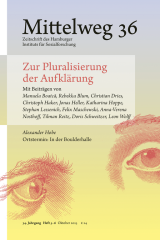Lasting peace agreements after wars and civil wars were for a long time considered to be conditional upon damnatio memoriae – the deliberate and reciprocal forgetting of violence and injustice. However, the established amnesty clause is only realistic where certain rules were not broken during war. The First World War is beyond its scope of applicability, the extermination war of the National Socialists even more so. Where forgetting is impossible, remembering is all that remains. Such remembrance is inextricably and paradoxically linked to forgetting: only what has been remembered can actively be forgotten.
Karin König
works at the Hamburger Institut für Sozialforschung.


